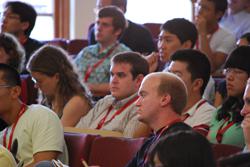
Energy@Stanford & SLAC Conference
The Stanford Precourt Institute for Energy catalyzes and focuses the full talents of the university on energy research and education, from basic science and technology, to policy and business. Additionally the institute helps the university develop energy-literate leaders through educational programs and disseminating research results.
Research
The Precourt Institute draws on experts and resources across the university to help accelerate the transition to an affordable, low-carbon energy system for the world. Since its founding in 2009, the institute has become the go-to place for scholars, business leaders, policymakers and others seeking solutions to the world’s most difficult energy challenges.
Stanford’s broad network of researchers working on energy-related problems spans more than 200 faculty members working in 22 academic departments and more than two dozen independent labs and programs.
The Precourt Institute fosters opportunities for scientists, engineers, social scientists, and legal and business scholars to collaborate on the world’s energy problems.The institute carries out its mission by funding early-stage energy research, developing new technologies and policies, educating leaders, and nurturing a vibrant energy ecosystem here and abroad. The seed grant program funds faculty research with potential for high impact on energy supply and use. These “proof of concept” awards, which encourage interdisciplinary research, bridge theory to early experiments and analysis. Positive results allow researchers to proceed to large-scale studies. In addition, the institute's senior fellows help coordinate similar efforts among other Stanford centers and programs.
The following centers, programs and projects are significant strands in the fabric of interdisciplinary energy research at Stanford.
- Bay Area Photovoltaic Consortium
- Center for Automotive Research at Stanford
- Energy Modeling Forum
- Global Climate & Energy Project
- Graduate School of Business Sustainable Energy Initiative
- Precourt Energy Efficiency Center
- Program on Energy & Sustainable Development
- Shultz-Stephenson Task Force on Energy Policy
- Stanford Bits & Watts Initiative
- Stanford Center for Carbon Storage
- Stanford Environmental & Energy Policy Analysis Center
- Stanford Institute for Materials & Energy Sciences
- Stanford Natural Gas Initiative
- Steyer-Taylor Center for Energy Policy & Finance
- SUNCAT Center for Interface Science & Catalysis
- TomKat Center for Sustainable Energy
Education & Outreach
The Precourt Institute works with Stanford schools and departments to identify promising energy scholars and areas of scholarship, and to make new faculty appointments to augment the university’s energy network. We disseminate the results of Stanford energy research to other institutions, the business community and the media. Institute staff provide these services to other Stanford energy research centers not large enough to employ such staff on their own. The Precourt Institute’s weekly Energy Seminar informs the Stanford community on energy and environmental issues and perspectives. Speakers come from leading research institutions, energy companies, government and other organizations. The seminar is offered as a for-credit course for Stanford students throughout the academic year, and is free and open to the public.
Energy @ Stanford & SLAC is a one-week conference for graduate and professional school students interested in energy. Students witness the breadth and depth of research across Stanford, and network with faculty, staff and fellow students.
The institute also assists the student-led Stanford Energy Club, which networks more than 600 students, scholars and local professionals interested in energy issues.
Key to the comprehensive energy network is creating avenues for interaction among Stanford scholars and people in business, government and other institutions engaged in solving energy problems. Toward that end, the Precourt Institute co-hosts conferences and workshops with other groups throughout the year. To facilitate interaction between Stanford researchers and the private sector, we support the Stanford Energy 3.0 program.
Sustainabilty Principles
Stanford University fully engages in sustainability challenges through research programs, projects and partnerships; campus buildings and student residences; energy, water, dining and transportation operations; and many courses, academic programs and learning activities. The Stanford community aspires to the goal of human wellbeing across generations and around the world, and is committed to including social, ethical, economic, ecological, environmental and resource considerations in decision making. We hope every student at Stanford shares this goal and learns how to engage effectively in reaching it.
-Provost John Etchemendy, January 2017
Learn more about Stanford's Sustainability Principles.



